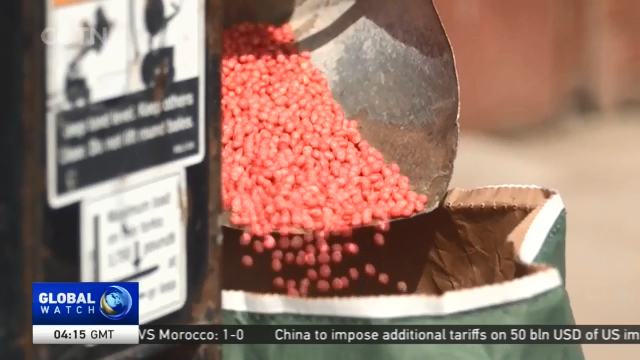
13:08, 16-Jun-2018
China-US Trade Friction: US soybean farmers wary of possible trade war
02:14

A "Washington-led disaster". That's how the Illinois Soybeans Association described the potential trade war with China a few months ago. And now it looks like their fears are coming true, with the US and China trading tariff actions. Nearly 60 percent of all US soybeans are exported to China each year. Earlier CGTN's Dan Williams talked to the association.
An early spring morning in Illinois and the Aavang family are preparing to plant soybeans on their farm. It's estimated that the U.S. will grow around 89 million acres of soybeans this year. That means soybeans has become the king of U.S. crops, exceeding corn, for the first time since 1983.
More than half the total U.S. crop - 57% - is exported to China market valued at nearly 14 billion dollars. But there are fears that could soon change.
MARK ALBERTSON ILLINOIS SOYBEAN ASSOCIATION "If there was any type of tariffs on our soybeans going to China it would be disastrous. We really rely on our export markets. China in particular is our biggest market. If we send our soybeans anywhere else, it would cost more and at the end of the day, farmers will end up being hurt by that."
U.S. farmers say the last thing they need is a potential trade war with China. Crop prices have seen an overall price decline of roughly 15 percent since 2012.
Farmer Michele Aavang is among the concerned.
MICHELLE AAVANG ILLINOIS FARMER "This news could really not be coming at a worse time for American farmers. We've been faced with low commodity prices for a number of years now all this is doing is adding concern and uncertainty for farmers. I would say if it goes to a trade war that would be devastating for agricultural communities."
MARK ALBERTSON ILLINOIS SOYBEAN ASSOCIATION "Soybean farmers are faced with natural disasters all the time, whether it is floods or tornados, or what-not. We are used to that. But, what we are not used to is a Washington-led disaster. And, at a time when soybean prices are already pretty low. As soybean farmers it is our number one issue. Maintaining trade relations, maintaining international markets is our number one issue."

SITEMAP
Copyright © 2018 CGTN. Beijing ICP prepared NO.16065310-3
Copyright © 2018 CGTN. Beijing ICP prepared NO.16065310-3